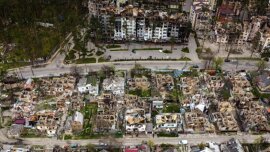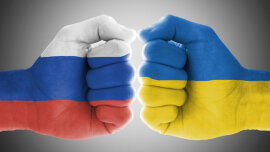We use these three terms a lot in narratives. The first refers to our past, the second to the hope for the future of Russians, and the third usually to express the pathos of the present. If we try to look at the history of Ukrainian lands from the perspective of "global" history, which is currently popular in academia, we get an interesting picture.
First, the national liberation or Cossack revolution of Khmelnytsky and Ruin, which came immediately after it, influenced the fact that the Cossack elites missed... The military revolution in Europe. The Cossack infantry, which was still one of the best in the world in the mid-17th century, no worse than the famous Spanish tercios, already in the first half of the 18th century. ceased to be the main striking force, and the role of the Cossacks gradually reduced to reconnaissance and auxiliary functions.part of the world, only the Russian Empire coped with this task, thanks, among other things, to the same Orthodox/Cossack elite. This allowed it to enter the ranks of superpowers for a while, capable of challenging even Napoleon. Let's move on.
After the Military Revolution, at the end of the 18th and beginning of the 19th centuries, the Industrial Revolution and industrialization took place. Resting on the laurels of Napoleon's victories, the Russian elites became dull and did not pay attention to it in time. Accordingly, only a humiliating defeat in the Crimean War and a very dubious victory on points in the Russo-Turkish War of 1877-1878 forced them to start moving.
As a result, large-scale industrialization in the Ukrainian territories at the end of the 19th century. begins only in the Romanov empire. Moreover, as Scott Reynolds Nelson shows in "Oceans of Grain", the Ukrainian territories become the economic "center" of imperial efforts. This concerned both industry and the agricultural sector. For global trade in Ukrainian grain, a system of railway connections with the South was being built during the time of Witte. Meanwhile, the Western Ukrainian territories, except for the Galician oil fields, remain cut off from global trade and economically unprofitable.
On the other hand, the liberal legislation of the Habsburgs allows them to calmly develop national projects that the same Romanovs blocked in the most stupid way, to their own detriment. When the revolution of 1917-1923 begins, Ukrainian sovereign projects, that is, those that claimed independence of their game, lose, but the efforts that the Bolsheviks spent on overcoming them forced them to behave not as unconditional triumphants, but rather like the North of the United States after 1865 during Reconstruction. As a result, many figures of Ukrainian projects go over to their side and try to build a Soviet Ukraine.
As soon as the Bolsheviks gained strength, they returned to the policy of "war communism" (Stalin in this sense was simply a faithful and consistent disciple of Lenin, not an apostate). By suppressing the Ukrainian countryside through collectivization and the Holodomor and through repression of the intelligentsia (the two main Ukrainian protest groups), the communists took complete control of most of the Ukrainian territories. In parallel, large-scale industrialization was carried out, and therefore, albeit belatedly, the Industrial Revolution did come to these lands.
Meanwhile, Western Ukrainian lands remain predominantly agrarian, oil deposits are almost exhausted after the First World War. If the Habsburgs developed only the service industry/infrastructure and provided liberal freedoms, then of the interwar heirs of empires, only Czechoslovakia repeated this "contract". Romania and Poland offered economic backwardness, isolation from global trade flows and... national oppression. A wonderful "cocktail" that forced young people who could not realize themselves to increasingly go underground (first communist, then nationalist).
After the end of World War II, Western Ukrainian lands received something similar to the rest of Ukrainian territories - the advent of the Industrial Revolution, in exchange for repression and a pendulum of national policy that oscillated between Ukrainization and Russification. The 21st century has prepared a new revolution for humanity, associated with Artificial Intelligence and a complete change in the socio-economic model of human civilization.
Since this is happening here and now, many do not yet realize that the scale and impact of this revolution is no less than the Agricultural, Military, or Industrial Revolutions, which Harari popularly wrote about in "Homo Sapiens." And here is the main question of our time - how does our, now officially called "War for Independence" fit into the global revolution of Artificial Intelligence?
After all, previous "national revolutions" led to the fact that we went through the global technological revolutions of modernity only through coercion, huge sacrifices and as part of other subjects. Do we want such a future for ourselves and those who will live after us? If not, then perhaps for the first time in history we should talk not about national revolutions and wars, but about how we should not miss the next global changes in the world? How can we ourselves become part of these changes and sovereignly influence our future? And we can not think about it, as we did not think in past centuries.
Just hope that the Russians are about to start another Trouble? However, how can even a hypothetical Trouble in Russia, which is not a fact that it will happen at all, save us from falling out of the context of the global AI revolution? Even the smartest of the "patriots" do not answer this question. What can we say about the rest. As a result, the celebration of life, as in this picture, continues, only the hangover is getting closer every day...

























